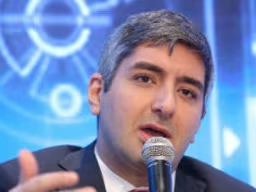Henri Arslanian
- Nationality: Canadian
- Job Post-programme: FinTech and RegTech Lead, China/HK, PwC; Adjunct Associate Professor, University of Hong Kong
“We live in a global business world now. Your academic background should be truly global as well.”
Did Henri Arslanian really need to go to business school? In 2012, he was a director in the Prime Brokerage Capital Consulting Team at UBS in Hong Kong, a financial markets and hedge funds expert with two masters degrees in law – one in transnational law from the University of Sherbrooke, Canada, the other in Chinese law from Tsinghua University, Beijing. But he wanted to gain a broader range of skills relevant to today’s business world – from accounting and finance to marketing and strategy. So he decided to join the EMBA-Global Asia programme.
“I’m a big believer that investing in your brain is probably one of the best investments you can make,” he explains. He saw the Executive MBA as a springboard for the next step in his career. Balancing its demands with his role at UBS was pretty intense. “I didn’t take any annual leave for those two years. I always tell people, you need to be fully committed to this, to really want to do it. You can do it in a light-touch way or in a very intense way, but you get out of it what you put in.”
Why this particular programme? He chuckles. “If you get married and it doesn’t work out, you can get separated and then get married again. But it’s very unlikely you’ll do a second MBA. So you’d better choose the right one! I’m a very global individual, personally and professionally, so to do an MBA in one place wouldn’t have made sense. We live in a global business world now. Your academic background should be truly global as well.
“I liked that I could pick and choose the courses I wanted to do from each university. It had a really good global perspective – not only academically but physically, being in three different locations. It also gave me access to three different alumni networks in Europe, America and Asia.” After Henri graduated he was a board member of the London Business School Hong Kong Alumni Club for a number of years.
He recalls the incomparable industry knowledge of his fellow students. “Case studies feature in MBAs around the world but at LBS you meet people from around the world who have first-hand experience. I remember on one private equity course, the professor was giving a case study on a recent telco company acquisition deal and he asked, is anybody familiar with this particular transaction? Well, in the class were an investment banker who had been working on that transaction, the CEO of a direct competitor of the acquired company, an engineer who had designed the assets sold in that transaction as well as an accountant who was working in an advisory firm advising on that transaction. Really showed you the quality of the program and of it students. That was a defining moment for me that I will never forget.”
There were great moments were outside the classroom too, including on a study trip to Brazil, which Henri describes as “a summer camp for adults”. But the real beauty of the Executive MBA is it opens your eyes on topics you didn’t previously understand. “It gives you technical skills in areas you’re not familiar with and it broadens your horizons to think about what’s coming next, what the future is going to hold. It’s about learning, sharing and connecting.”
Most of the people Henri met on the programme changed jobs during or after it. Henri was no exception. Not long after graduating he switched from banking to fintech. After a year at a small start-up he jumped to PwC where he leads the firm’s fintech and regtech [regulatory technology] practice in Hong Kong. He also teaches Entrepreneurship in Finance at Hong Kong University and has published a bestselling book on the same subject. He sits on various boards and even advises the Hong Kong regulator and government.
Henri’s TEDx on how fintech is shaping the future of banking has been watched by nearly 60,000 people. “We are living in the most exciting time in banking history,” he says. “There will be winners and losers in the fintech revolution – some banks will be able to adapt and transform, others won’t. I have a 15-month-old daughter and I honestly wouldn’t be surprised if she opens her first bank account with Amazon or Facebook.”





